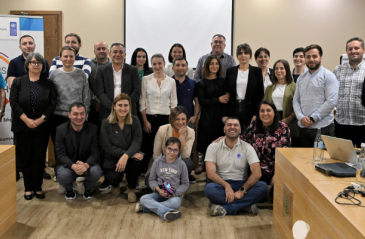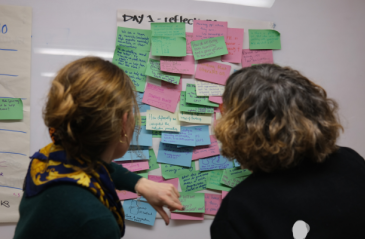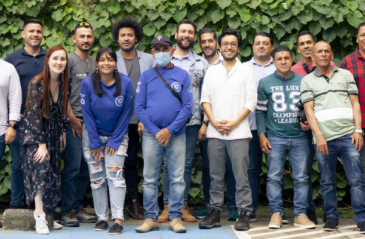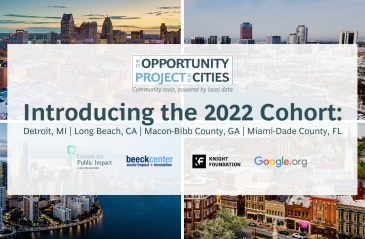
Learnings from Urban Imaginaries – Georgia

Patrick Dlamini believes Africa needs to get on with utilising its natural resources
Share articleAfrica's trade corridors need to be more competitive and efficient
Share articleNew infrastructure boosts regional trade which in turn helps reduce poverty
Share articleWe put our vision for government into practice through learning partner projects that align with our values and help reimagine government so that it works for everyone.
Midrand is an apt place to find the Development Bank of Southern Africa (DBSA). Located in between Johannesburg and Pretoria, the site reflects DBSA's vital position at the heart of the development agenda not only for South Africa but for the whole southern sweep of the continent as well. And for someone like Patrick Dlamini, its chief executive since 2012, there is no better place to channel a lifelong passion for Africa into positive, sustainable change and progress.
But while Dlamini's passion for the continent rings out loud and clear, he is equally adamant that enthusiasm is not enough - it's past the time to put the pedal to the metal. "I think of the many strengths and potential strengths that the continent has," he says. "Like the endowment of natural resources - it is like a gift from God. But now we need to make sure we get on and optimise them." For that, though, they need a strong and functioning infrastructure - a fact which features front and centre in Dlamini's hopes, aspirations and plans for the future.
It's no secret that Africa's infrastructure needs to be improved. Similarly, there is no shortage of literature and research detailing the scale of the challenge. But the fact that this issue has been on the agenda for many years does not lessen its significance. While the list of priorities is daunting, Dlamini pinpoints the long-planned North-South Corridor, a transcontinental interconnector ultimately connecting Cape Town in the south with Cairo in the north, as absolutely vital. Not only will it help bring African citizens closer together but - crucially - it will boost trade by helping to transport natural resources to market.
"I see this as a corridor of trade," he explains. "Africa's trade corridors are part of the global supply chain, and we need to ensure that they are competitive and able to ensure that the products of the continent stay competitive - because there are other countries which also have an endowment of natural resources. It comes down to competitive pricing, which is very much the result of how efficient our corridors of trade are."
To illustrate his argument, he goes on to point out that 37 of Africa's 54 countries are sea-facing. This means that they have a responsibility to the continent's landlocked countries in terms of their access to international markets. "We need to make sure that Africa's landlocked countries have a seamless facilitation of trade and flow of both people and goods," he says. "This means they need to cross borders to ports of entry and be both transparent and efficient - as they are in other countries. The sea-facing countries need to be efficient and, for example, make sure that the turnaround time for merchant shipping is quick at their ports. This is extremely important."
The DBSA was set up in 1983 and is wholly owned by the South African government. Its mission is to "advance the development impact in the region by expanding access to development finance and effectively integrating and implementing sustainable development solutions". In practice, this means developing social infrastructure, supporting economic growth and regional integration, and promoting the sustainable use of scarce resources.
Dlamini joined the DBSA from serving as chief executive of the Air Traffic and Navigation Service, where he turned an insolvent organisation into a profitable one. He believes that the DBSA is well placed to help African countries learn from successes from other parts of the world, but adds that the private sector can also help shine a light. "Firms like The Boston Consulting Group have global experience and a global perspective which needs to be brought to the continent," he says. "People need to understand how other parts of the world have been able to overcome these types of challenges. African countries need to learn from these experiences and be able to replicate their success to make sure that Africa is not left behind."
He is also keen to stress that better infrastructure is a crucial tool in helping alleviate poverty. Although the cranes that adorn city skylines from Kigali to Kinshasa tell a story of economic expansion and progress, huge disparities and inequalities continue to stalk too many countries. Perhaps such diversity is only to be expected. As Donald Kaberuka has pointed out, a continent of 54 countries will always have its mix of good stories and bad. But nonetheless, in a continent where one in four is still undernourished, it is clear that more needs to be done.
"New infrastructure has a vital knock-on effect," he points out. "If we can upgrade our infrastructure, then this helps our regional trade, which in turn helps address poverty. Currently, our regional trade is very low but if we can improve it, this will lead to more jobs for Africans. So we need our infrastructure to be efficient and well maintained, as well as achieving a seamless integration between the various countries on the continent."
Dlamini, is optimistic. "Partnerships are key in order for Africa to keep accelerating and progressing," he concludes. "This means that when the DBSA looks at the potential impact of projects, we identify the right partners to help move it forward. It is really a case of strength in numbers." One thing's for sure: with 54 countries and a total population of well over one billion (and rising), there will be no shortage of members of Team Africa to call upon in the months and years ahead.










